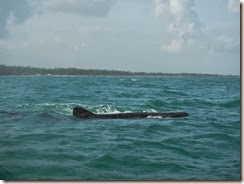 To make for a smoother transition back into the country (and to kill time before going to the in-service training of the new Education Volunteers), Belle and I took a detour to Mafia Island the day after our return to country. Apparently NOT known for housing all of the head Tanzanian mobsters (who knew?), Mafia is actually well known for having whale sharks pass by on their annual migration pattern from the months of November – early February. We were able to see 5 or 6 of them and actually got to swim and snorkel alongside them! Whale sharks are apparently the largest fish in the world, but pose no threat to humans because they are filter feeders that only eat plankton. They have really cool spots on their bodies, which are unique to each individual and can be used as an alternative “tagging” method for biologists to identify them. Even though they are relatively slow swimmers compared to other ocean-dwellers, they were able to easily out-swim us as soon as we entered the water. But we were still able to get close enough in the boat so that when I jumped in, I almost got smacked in the face by one’s massive tail fin. It was a lot of fun!
To make for a smoother transition back into the country (and to kill time before going to the in-service training of the new Education Volunteers), Belle and I took a detour to Mafia Island the day after our return to country. Apparently NOT known for housing all of the head Tanzanian mobsters (who knew?), Mafia is actually well known for having whale sharks pass by on their annual migration pattern from the months of November – early February. We were able to see 5 or 6 of them and actually got to swim and snorkel alongside them! Whale sharks are apparently the largest fish in the world, but pose no threat to humans because they are filter feeders that only eat plankton. They have really cool spots on their bodies, which are unique to each individual and can be used as an alternative “tagging” method for biologists to identify them. Even though they are relatively slow swimmers compared to other ocean-dwellers, they were able to easily out-swim us as soon as we entered the water. But we were still able to get close enough in the boat so that when I jumped in, I almost got smacked in the face by one’s massive tail fin. It was a lot of fun!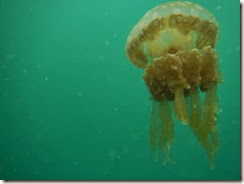
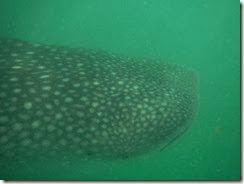
After Mafia we decided to make an impromptu trip to Zanzibar for a couple days. I had been there once before when Christine came to visit a year and a half ago, but it was Belle’s first time, so we did the spice tour which includes a nice trip to the beach at the end. More delicious sea food and fresh sugar cane juice as well.


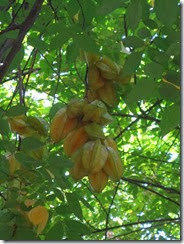
The real reason we had to stay in Dar all that time though was because the new group of Volunteers who arrived last July were having their in-service training, and our Shika na Mikono science team was given a day to do sessions for them. For this training, volunteers come with their counterparts (Tanzanian teachers at their schools who they work well with) and go through the sessions together. We themed the Shika sessions in a game show setting called “Whose Lab is it Anyway?” It consisted of three rounds for teams of PCVs and Tanzanians together to compete in making useful math and science teaching aids and hands-on activities.

The first round had all teams separated by subject (math, physics, biology, chemistry), trying to use a table of local materials (aka trash) to teach about a topic from the Tanzanian syllabi. We Shika members served as coaches/judges and selected one team from our subject to advance to the next round. For Round 2, the four remaining teams were given additional time and better materials to prepare a 3-minute mini lesson from one of three assigned topics from their subject. While they were preparing that, the rest of the teams were able to get guidance on the national exams or compete in a “losers bracket” science competition of constructing buildings out of straws. The remaining teams presented their mini lessons to the audience, but were judged on a scale of 1-10 by our panel of Shika experts. Without meaning to, I apparently became the Simon of the group because I was not quite as lenient of a scorer as the rest of the judges. The top 2 teams advanced to Round 3, where they were given 5,000 shillings (about 3 dollars) of credit to buy a limited set of items found in local stores to prepare a hands-on activity that could be performed by a full class of students. This time, we played the role of the students, but the audience got to vote for the winner. We gave out prizes to winning teams that we had picked up in our recent trip to America. Everyone seemed to enjoy it, especially all the cheesy game show music we cued up throughout the show.
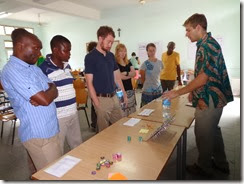
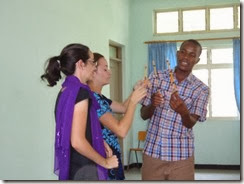
We had a great time preparing everything too (exhausting though it was), and coming up with new explosion ideas for the introduction. For this one, we rigged up several sets of hydraulic presses using plastic syringes and tubing which could be used to push small cups of kerosene into charcoal stoves below, which made big flames timed to the lyrics of Fall Out Boy’s new “Light it Up” song. It was cool because using the syringe presses made it possible for someone to hide behind the front table and “detonate” the explosions remotely without being seen by the audience. Then Ben, the host, came in and announced the rest of us one-by-one as we popped out from our hiding places (I was hiding behind a curtain) and dropped smoke bombs into the stoves. The people in the front row got a bit of smoke in their faces, but it still got a good reaction from the crowd.
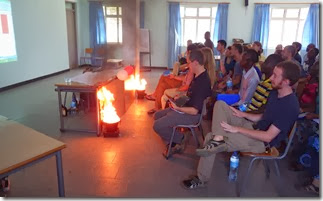
In keeping with the "Changing of the Seasons” theme, this was likely the last Peace Corps training that our group will do together, since this new group of volunteers will soon be taking over the reins of Shika. Soon we will choose our successors with the help of the Peace Corps staff, and hopefully be able to serve as mentors to them during the remaining time that we all have in country before we hand things over completely. It’s always difficult passing on projects from one class to the next, but it helped last year that I was extending and could help bridge the gap a little bit. It’s doubtful that anyone from the current group will be extending into next year, so we want to get the new group started as quickly as possible so that we can work with them before we leave. We still have a lot planned for the near future as well, and will hopefully continue working with the Ministry of Education doing teacher trainings like we started last year. As for me, I’m now heading back down to the rains and cooler weather of the southern highlands to my site for the start of another school year and teaching Form II math. Helia Mwaka Mpya! (Happy New Year!)